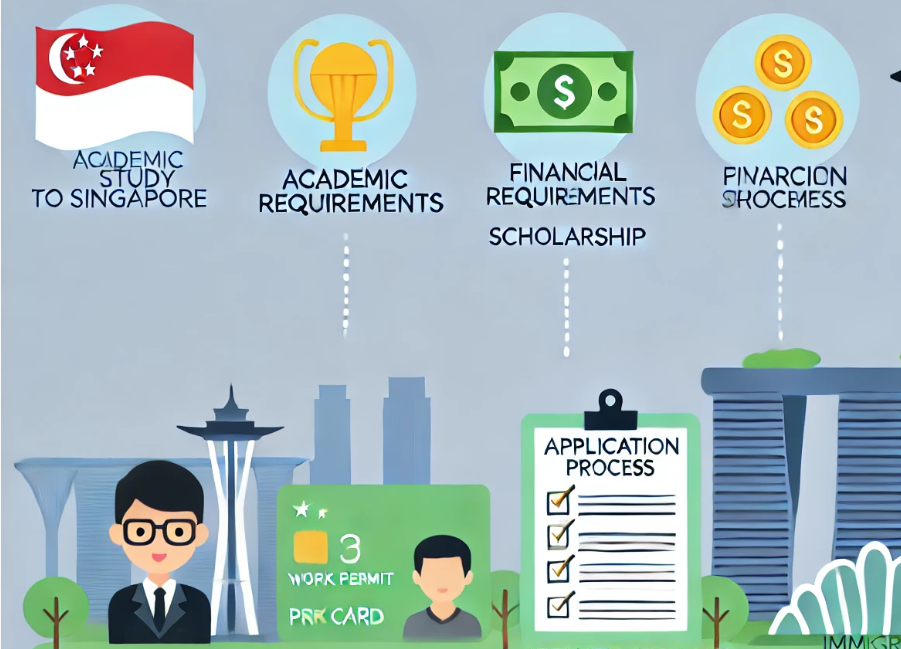- Remittance
- Exchange Rate
- Stock
- Events
- EasyCard
- More
- Download
- Creator

Quick Guide to Studying and Immigrating to Singapore: Essential Requirements and Application Process
Singapore attracts numerous international students and immigration applicants with its high-quality education system, multicultural social environment, and robust economy. As an education and economic hub in Asia, Singapore not only offers world-class educational resources but also provides extensive career development opportunities for graduates. This article will unveil the essential requirements and application process for studying and immigrating to Singapore, helping you smoothly embark on your study and life journey in Singapore.

Basic Requirements for Studying in Singapore
Academic Requirements
To apply for undergraduate courses in Singapore, applicants need to provide a high school diploma or equivalent qualification.
For master’s and doctoral courses, a relevant bachelor’s or master’s degree is required.
Applicants need to provide proof of English language proficiency. Generally, undergraduate courses require an IELTS overall score of no less than 6.0, while master’s courses require a score of no less than 6.5.
Financial Requirements
Tuition fees in Singapore are relatively high, but the quality of education and the career opportunities post-graduation make the investment worthwhile. Undergraduate courses cost approximately SGD 15,000 to SGD 40,000, while master’s courses cost around SGD 20,000 to SGD 50,000. Additionally, monthly living expenses range from SGD 800 to SGD 1,500.
During the study period, secure and convenient international remittance services are crucial. BiyaPay, established in 2019, is a global remittance platform headquartered in Singapore. BiyaPay supports the recharge of digital currencies (such as BTC, USDT) and their exchange into fiat currencies like USD, HKD, and GBP. Covering most regions and countries worldwide, BiyaPay allows transfers directly into your bank account with fees as low as 0.5%. It offers secure, fast, and affordable international remittance services. The greatest advantage of BiyaPay is its support for large remittances, making financial management during your study life more convenient and efficient.
Application Materials
- Personal Statement: Applicants need to showcase their academic background, career goals, and reasons for choosing to study in Singapore.
- Recommendation Letters: Typically, two to three recommendation letters are required. Recommenders can be the applicant’s teachers, professors, or employers.
- Transcripts and Academic Certificates: Applicants need to provide complete transcripts and academic certificates, which need to be notarized or certified.
Application Process for Singapore Universities
- Choosing Schools and Majors
Based on your interests, career goals, and academic background, choose suitable universities and majors. Singapore has several world-renowned universities, such as the National University of Singapore, Nanyang Technological University, and Singapore Management University. - Preparing Application Materials
Understand the application deadlines of various universities in advance. Start preparing all application materials, including personal statements, recommendation letters, transcripts, and language scores, six months to a year before the application begins. - Submitting Applications
Most universities in Singapore use online application systems. Applicants need to fill in personal information, upload application materials, and pay the application fee through these systems. - Interviews and Entrance Exams
Some programs may require interviews, which are generally conducted via video or telephone. Prepare for common questions such as personal background, academic interests, and career plans to demonstrate your communication skills and academic potential. - Receiving Admission Letters
Once you receive the admission letter, you need to accept the offer and pay the tuition fees within the specified time. Follow the university’s instructions to handle visa and accommodation arrangements.
Pathways from Study to Immigration
Employment Pass (EP)
Employment Opportunities for Graduates: After graduation, students can apply for Singapore’s Employment Pass (EP), which is the main way for graduates to stay and work in Singapore.
The minimum monthly salary requirement for applying for an EP is usually SGD 4,500. This requirement ensures that the applicant’s position and salary level are high enough to meet Singapore’s demand for highly skilled labor. For more senior applicants or higher positions (e.g., in the financial industry, the requirement is SGD 5,000), the salary requirement may be higher.
Foreign nationals holding an EP can apply to become Singapore Permanent Residents (PR) after working for a period of time. PR status provides more long-term residence and job stability and the possibility of further applying for Singapore citizenship.
EP holders can also apply for Dependent Passes for their spouses and children, allowing family members to live and work in Singapore together.
Conclusion
With its excellent educational resources and abundant career opportunities, Singapore has become an ideal choice for many international students and immigrants. Whether finding a desirable job after studying or realizing self-value through entrepreneurship, Singapore provides ample development space for students. We hope this article helps you better understand the essential requirements and application process for studying and immigrating to Singapore, paving the way for your study and immigration journey to Singapore.
In the selection and application process, maintain a positive attitude and patience, fully prepare all materials, and plan your time wisely. We wish you a fulfilling and enjoyable study and life in Singapore!

























